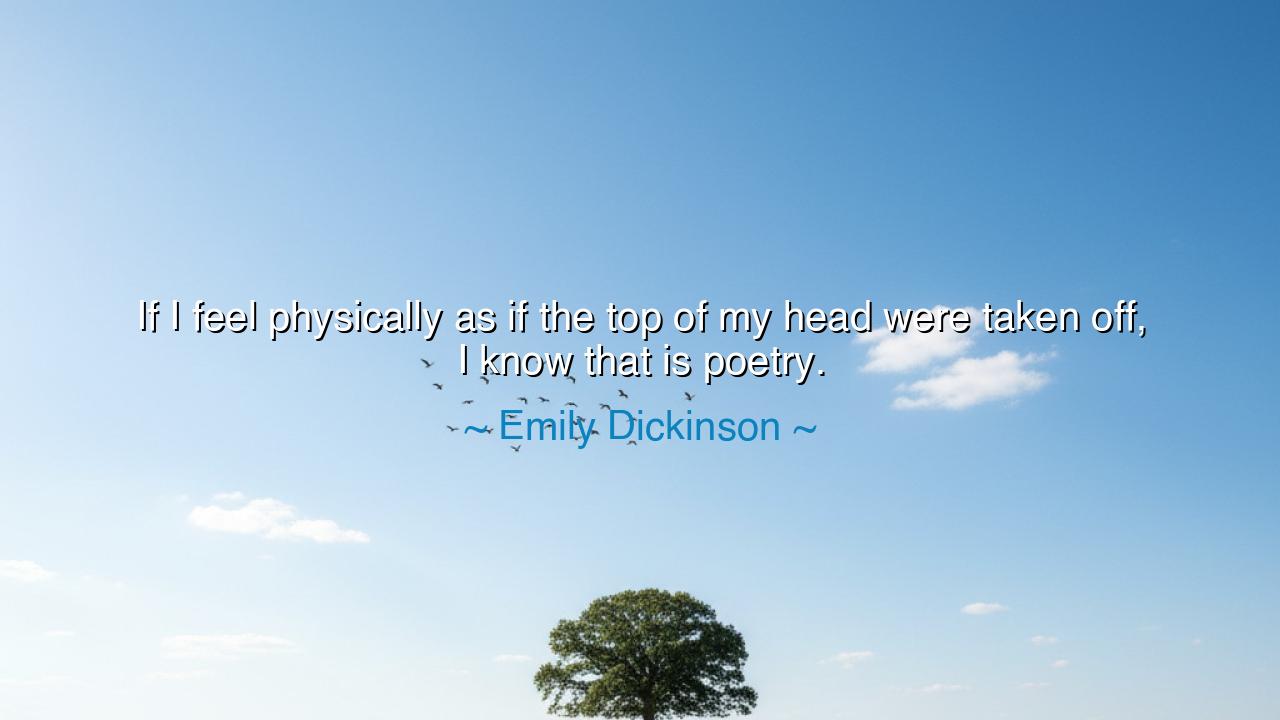
If I feel physically as if the top of my head were taken off, I






Hear the thunderous whisper of Emily Dickinson, the recluse of Amherst and prophetess of the inward life: “If I feel physically as if the top of my head were taken off, I know that is poetry.” In this startling confession, she reveals not only her own measure of poetry, but the very essence of what true art must do. It is not enough for poetry to charm, to soothe, or to entertain. It must be a force so great that it shatters the boundaries of the self, opening the mind to realms it had never before imagined. To Dickinson, poetry was no gentle ornament; it was revelation—violent, ecstatic, transformative.
The meaning of this quote lies in the experience of being struck by words that carry more than thought. True poetry, she insists, is not recognized by reason or analysis, but by the overwhelming physical sensation it produces. It is the feeling of the skull split open, of the mind cracked wide, of the familiar world suddenly made strange and luminous. Lesser poems may amuse, flatter, or entertain, but only the great ones destroy us—destroy, so that we may be remade. Poetry, for Dickinson, is not a decoration of life but the upheaval of it.
The ancients would have understood this vision well. The Greeks spoke of divine possession, of poets seized by the Muses, their minds torn open by inspiration. To be struck by poetry was to be taken out of oneself, to stand in ecstasy, “ekstasis”—literally, to be placed outside the body. Dickinson’s image of the head torn open is a modern echo of this ancient belief: that true poetry removes us from ordinary existence and places us in communion with something vast, mysterious, and divine.
History offers many who have felt this tearing. Consider the young soldier who read Wilfred Owen’s war poems for the first time. The verses did not flatter; they did not soothe. They tore away illusions of glory and revealed the horror of war in raw truth: “Dulce et decorum est pro patria mori” was exposed as the lie it was. Those poems struck like a blade to the mind, leaving the reader forever changed. Here was Dickinson’s measure of poetry—the breaking open of the skull, the irreversible transformation of perception.
So too did Shakespeare’s Hamlet deliver such blows. When the prince declared, “What a piece of work is man,” audiences heard both admiration and despair intertwined. Such lines cannot be heard without feeling the world tilt, without sensing the head’s crown split open to new dimensions of thought. This is why Dickinson insists upon her strange but perfect image: great poetry is not soft—it wounds, it explodes, it annihilates, and only then does it illuminate.
The lesson for us is this: do not mistake light verse or easy rhymes for true poetry. Seek the words that strike you, that disturb you, that make you tremble as if some hidden gate in your mind has been broken open. Do not flee from them, though they unsettle, for in that very unsettlement lies their gift. Poetry is not always comfort—it is awakening. And awakening is rarely gentle.
Practical is this path: when you read, ask yourself—did these words merely pass through me, or did they break me open? When you write, do not settle for cleverness; seek instead the force that will tear through silence and shake the soul. Accept Dickinson’s measure: if it feels as though the top of your head has been taken off, then you have touched true poetry. Cherish such words, return to them, let them remake you. For in that destruction lies creation, and in that wound lies the doorway to truth.






PTphan tien
Dickinson’s quote makes me reflect on how poetry can transcend mere words and become an experience that affects the body and mind in unison. It seems like the best poems create a feeling that lingers, much like the sensation she describes. Do you think this physical experience is necessary for poetry to be considered truly profound, or can there be different ways of measuring its impact?
CCoi
I find it interesting how Dickinson equates poetry with such a physical sensation. It suggests that poetry is not just a mental or emotional experience—it’s something that literally shakes you, like an overwhelming physical force. Do you think that poetry has this kind of impact on everyone, or is it more about the individual’s openness to being affected? How do we create poetry that evokes such deep, embodied reactions?
LNHoang Long Ly Nguyen
Dickinson’s description of the physical sensation she associates with poetry is so powerful. I’ve often wondered if this kind of intense emotional or physical reaction is what makes poetry so compelling. Do you think that the best poems are those that affect us at such a deep, visceral level? Or can poetry be just as impactful without provoking such strong, physical reactions? What makes a poem truly unforgettable?
LANguyen Ngoc Lan Anh
This quote from Emily Dickinson captures the almost transcendental experience of poetry. It’s as if poetry can strip away all the noise and clutter in our minds, leaving us with a pure, profound feeling that resonates deeply within. But is this sensation something that all poets experience, or is it unique to certain works or moments? How can poetry make us feel so exposed and vulnerable while still feeling so beautiful and necessary?